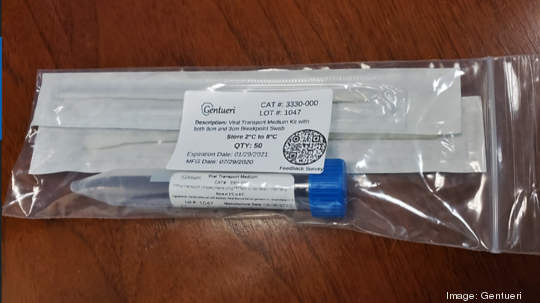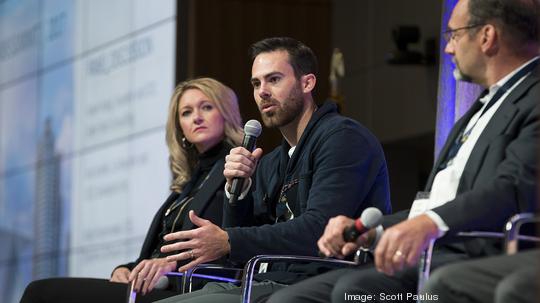Over the last six months, Covid-19 has changed the lives of virtually everyone. Seemingly over night, we stopped working at the office, stopped visiting our favorite restaurants and began wearing masks everywhere we still had to go.
Like many other parts of the country, Wisconsin has been greatly imapcted by the virus, both from a health and economic standpoint. As of press time, there have been more than 75,000 cases of coronavirus in Wisconsin, and the state's private sector jobs are down by more than 216,000 roles this year, according to Wisconsin's Department or Workforce Development.
Throughout the turmoil, though, some of Wisconsin's tech and startup companies have risen to the occasion to address some of the biggest issues facing society. To highlight Wisconsin tech and startup companies working diligently and swiftly to address Covid-related issues, Wisconsin Inno has curated a list of Crisis Innovators.
A Crisis Innovator is a company that is addressing the virus head-on, whether it be through developing a vaccine, designing Covid test kits or helping retailers abide by social distancing guidelines.
At their core, Crisis Innovators are working to keep people safe amid the virus, and improve the lives of everyone as we endure what is shaping up to be a long and frustrating era.
FluGen
Shortly after the pandemic began, Madison biopharmaceutical startup FluGen started working with the University of Wisconsin-Madison and India-based Bharat Biotech to develop and test a vaccine for Covid-19.
Since its founding in 2007, FluGen has been developing vaccines to fight mutating strains of influenza around the world. And that flu vaccine candidate, known as M2SR, which is currently being tested in human clinical trials, is being used as the template to develop a Covid-19 vaccine called CoroFlu.
FluGen, founded by Gabriele Neumann, Paul Radspinner and Yoshihiro Kawaoka, is constructing the CoroFlu vaccine by inserting gene sequences from SARS-CoV-2 into M2SR so that the new vaccine will induce immunity against the coronavirus, said Radspinner, FluGen’s CEO.
The vaccine is currently being tested in animals at UW-Madison’s Influenza Research Institute, and Phase I human trials are expected to begin this fall at Bharat. Bharat has already commercialized 16 vaccines, including one that fights against H1H1.
Once the CoroFlu is tested and approved, Bharat will manufacture it for global distribution, saying it can produce nearly 300 million doses per year.

Like M2SR, CoroFlu will be delivered to patients through the nose via an intra-nasal drop method that helps activate the immune system.
“That is the site of infection,” Radspinner said.
FluGen’s vaccine will likely not be ready for distribution amid the first round of vaccines available globally, but there will be a second round as demand will likely remain strong, Radspinner said.
“There’s certainly going to be a second round of vaccines because this first round has a lot of promise, but we don’t know where they’re going to end up and which populations they’ll be successful in,” Radspinner said.
To date, FluGen has raised more than $50 million from private investors and about $40 million from the U.S. government, primarily from the National Institutes of Health and the Department of Defense, Radspinner said. FluGen currently employs 17 people.
“It shows what a small company in an area like Wisconsin and Madison, where some people might not think a development of something as resource-consuming as a flu vaccine could be done,” Radspinner said. “We’ve shown we’re capable of doing that. Now we just got to get it over the finish line and we’ll see what happens.”
Gentueri
This Madison-based startup pivoted sharply when the pandemic began.
Gentueri, founded by Randy Nagy and formerly known as Fast Forward Forensics, originally launched in 2012 making medical device kits that allow for better and more accurate readings when doing genetic tests and DNA analysis, particularly for victims of sexual assault.
But shortly after the Covid-19 crisis began, Gentueri transformed its kits into Covid-19 test kits.
“It was March 17 and I said ‘Alright, stop the presses, we’re in the Covid business,’” Nagy said.
Now, Gentueri is selling its kits to the Wisconsin Department of Health and helping to facilitate Covid testing for residents across the state. In addition to the Department of Health, Gentueri has also supplied kits to Madison-based Exact Sciences, and to organizations in other nearby states like Illinois, Missouri and Indiana.
But transforming its sexual assault DNA kits to Covid kits wasn’t as simple as it sounds, Nagy said.

“The only similarity is they come in boxes and bags,” Nagy said. “What goes inside the kit is totally different.”
Gentueri is producing 15,000 Covid kits per day, which include both nasal and throat swabs. Once samples are collected, they are then processed with a laboratory partner.
Because of the Covid crisis, Gentueri’s business has grown considerably. In 2019, revenue was less than $100,000. So far in 2020, revenue has topped $3 million, and Nagy expects it to reach $6 million by year end.
To accommodate the growth and a team of 33 people, Gentueri is moving to a larger production facility in Verona, where it will be able to produce 250,000 kits per month, Nagy said.
Looking ahead, Gentueri, which raised closed to $500,000 in outside funding, is working to develop a self-collection Covid kit so that patients don’t have to see a medical professional to get tested for the virus.
“The fact is this is right up our alley of doing remote sample collection and most people have not been doing that. It gives us an advantage as to how we can really help a lot of health departments around the Midwest,” Nagy said. “It’s been nice to be able to work with these agencies and help through the crisis.”
Nimble Therapeutics
The Madison-based startup that was spun out from Switzerland-based F. Hoffmann-La Roche is collaborating with Roche Diagnostics to discover and develop novel peptide-based molecules for diagnostics of SARS-CoV-2, the virus that causes Covid-19.
Nimble Therapeutics, which is led by CEO Jigar Patel, is developing a chemical synthesis technology for drug development. The company's technology provides the ability to synthesize millions of unique natural and modified peptide-based molecules simultaneously.
The team at Indianapolis-based Roche had been developing the technology for a number of years, but executive leaders felt the business model would be best supported if it were an independent company, Patel previously said.
Now, Nimble is extending its proprietary peptide synthesis, screening and optimization platform and Roche will leverage its technology to detect SARS-CoV-2.
In 2019, Nimble closed on a $10 million Series A round of funding to commercialize its chemical synthesis technology. The financing round was led by San Francisco's Telegraph Hill Partners.
Scanalytics
At the beginning of the pandemic, Scanalytics, a Milwaukee-based company that makes floor sensor technology to track and collect data on human movement patterns, quickly rolled out a new and free service to help Metcalfe’s Markets in Wisconsin manage foot traffic amid social distancing orders.
Scanalytics’ system provides real-time data to Metcalfe’s workers that can be viewed on mobile devices and includes an indicator that alerts workers when capacity is reached.
But in addition to working with Metcalfe’s, Scanalytics has also begun working with other sorts of companies to help them know if their existing infrastructure, like cameras and wifi, can be used to manage foot traffic amid the Covid-19 crisis, Scanlin said.

“The latest, likely most interesting [development] has been our focus on helping companies by doing current system audits to help them understand if their existing infrastructure can be used as a way to operate in the new Covid-impacted reality,” Scanlin said in an email to Wisconsin Inno.
The new service allows clients to automatically track entries and exits at their locations, embed and share occupancy widgets to display current traffic at locations, and communicate with visitors about how busy spaces are and when the best times are to visit.
The initiative has Scanalytics now working with companies across the globe. In early August, Scanlin was in the Middle East, helping local clients manage the Covid-19 crisis.
Scanlytics, co-founded in 2013, has served hundreds of customers in industries ranging from retail, commercial real estate and health care. Clients have included Microsoft and Intel.
The company, which participated in the startup accelerator program gener8tor in 2013, has raised $4.3 million in venture capital funding to date.
Wantable
Wantable, a personal styling company that sends customers hand-picked beauty items and fashion accessories, quickly turned its logistics force and network to crowdsource face masks for the region’s medical professionals.
In just 24 hours, the company launched its “Sew Good” campaign in March, which organized an army of at-home crafters to sew masks. Throughout the campaign, more than 20,300 masks were sewn and donated.
The masks were distributed to health care facilities from the company’s fulfillment center, free of charge. Wantable, founded in 2012 in Milwaukee by CEO and President Jalem Getz, has raised $6.5 million, according to Crunchbase.
In 2018, the startup raised $1.4 million from Cream City Venture Capital, the venture arm of Northwestern Mutual, BrightStars Wisconsin Foundation and other private investors.



